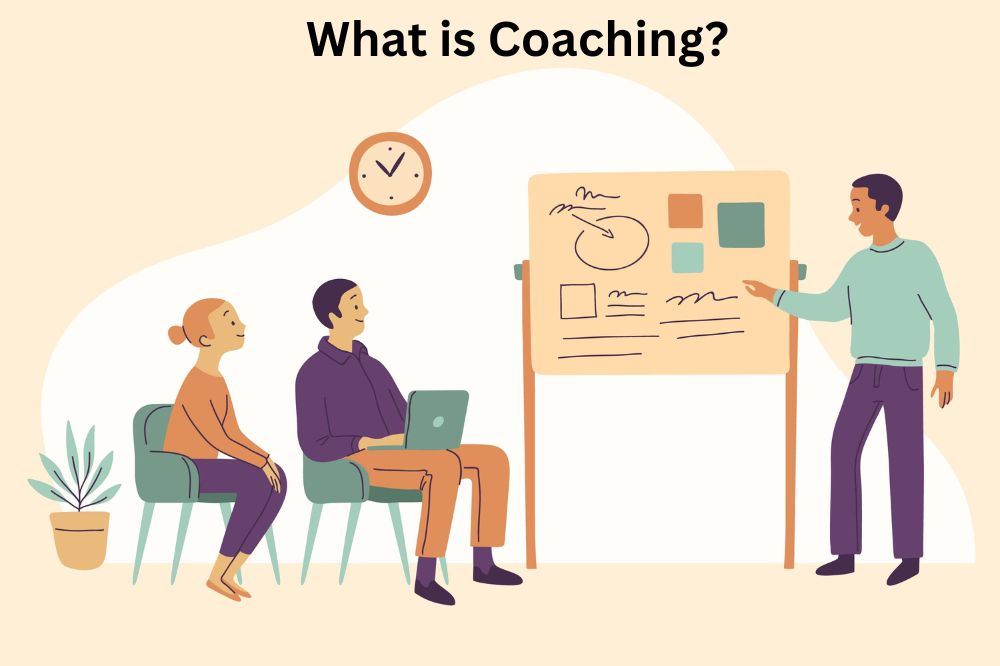Overview
Coaching has emerged as a powerful and versatile tool that can guide individuals and organizations to achieve their desired goals. At its essence, coaching is a collaborative and goal-oriented process aimed at helping individuals, known as “coachee,” to achieve their personal and professional objectives. Coachee, who are trained and certified in various coaching methodologies, support coaches by offering guidance, asking thought-provoking questions, and assisting them in defining and reaching their goals.
The true importance and worth of coaching in a business environment can be evaluated by an ICF Coaching (International Coach Federation) study that says, “99% of clients who engage in coaching are satisfied with the experience, highlighting its value in personal and professional development.”
Further, coaching is about asking the right questions, actively listening, and offering guidance without providing direct answers. It is a journey of self-exploration, where the coach delves into their aspirations, identifies obstacles and works with the coach to create a clear path forward. Let us take the journey ahead and expand our knowledge about the intriguing world of coaching.
What is Coaching
In a world where personal and professional development is highly valued, the concept of coaching has gained immense traction.
Coaching is described as a collaborative and goal-oriented relationship between a trained coach and an individual, often referred to as the coachee. The primary aim of a coaching program is to facilitate personal and professional growth, enabling individuals to overcome challenges, capitalize on their strengths, and achieve their desired outcomes.
Coaching is distinct from mentoring, counseling, or consulting, as it focuses on empowering the coachee to find their solutions and make informed decisions. It is future-oriented, emphasizing the coachee’s goals and aspirations, and is applicable across various facets of life, from career and leadership to personal development and well-being.
Understanding Coaching in the Workplace
Employee Coaching, Business Coaching, and workplace Coaching all fall under the umbrella of Coaching in the workplace. When a coach (a manager or supervisor) helps their employees to grow and develop their skills professionally, coaching plays a key role. Corporate Coaching in the workplace forms a part of a company’s learning and development programs, which are untied into individual employee training programs. To understand the importance of coaching in the workplace, you need to know the aim of providing coaching to employees in the workplace, especially new joiners.
The aim of providing Coaching in the workplace is to promote a two-way communication process between the coach and the coachee; in this way, the coach can quickly identify the areas for improvement and reinforce strengths and future development of their employee performance. Thus, this is achieved only by focusing on specific performance objectives, goals, and skills. Corporate Coaching comes into force by providing complete training sessions and equipping employees with knowledge and tools such as performance evaluations, goal setting, regular check-ins, feedback loops, active listening, etc.
Corporate Coaching trains employees to do their best and remain highly productive. A coach always works to improve learners’ performance or help them achieve their goals. A coach always differs from a mentor. Mentors know more than mentees and answer their questions. However, Coaching doesn’t require knowing all the solutions, unlike providing advice or mentorship. Instead, a coach has the skills to guide and empower learners to achieve goals.
Corporate Coaching has grown rapidly over the last few years, when high-level executives are ready to provide leadership training to their employees. Coaching comes in all forms and shapes, it has different focus areas and approaches. All these types of corporate Coaching need different expertise and come with different outcomes.
Some coaches majorly focus on career development, professional growth, leadership development, and management Coaching. Others are expert coaches for businesses, including executive Coaching, leadership Coaching, sales Coaching, employee Coaching, peak performance Coaching, team and organizational Coaching, career growth Coaching, corporate Coaching, business Coaching, HR Coaching, communication effectiveness Coaching, etc.
On the other hand, Coaching for individuals includes physical and well-being Coaching, mental fitness Coaching, Life Coaching, nutrition Coaching, Relationship Coaching, career growth Coaching, working parents Coaching, Financial Coaching, transformational Coaching, holistic wellness Coaching, etc.
Thus, different types of corporate Coaching are appropriate for different personal and professional growth goals. Virtual Coaching makes high-quality Coaching more accessible to more people at all levels. With virtual Coaching, you can further your development regardless of location or time constraints.
Not all supervisors need to be coaches when it comes to leadership development for the professional and personal growth of individuals. It is increasingly important, however, that managers be effective coaches. That doesn’t mean that they will act in the same capacity as experienced coaches but they can adopt a Coaching mindset that can adopt a Coaching approach when managing their direct reports.
What corporate Coaching skills do you need as a leader? In a coaching management style, the approach and goals are informal, with the team practicing and building skills together. Let’s take a look at some of the key elements of the Coaching leadership. They are as follows:
- Professional development- When it comes to developing their teams, leaders need to have a keen eye for helping their team members continue to grow. This means modeling higher-level skills and behaviors. This creates supported opportunities for team members to practice new skills and behaviors.
- Goal setting- It’s hard to know where you’re going without a map. A leader can help team members develop goals that are meaningful individually and to the organization.
- Future-mindedness- The Coaching approach requires some levels of optimism and pragmatism. In better terms, we call this future-mindedness. When leaders can look ahead to the future with this lens, it better equips their teams for the change and uncertainty that is bound to come.
- Feedback- The Coaching process relies on the power of feedback. In order to adopt new behaviors, the coachee needs to receive feedback on what behaviors are desired and effective. That means leaders need to sharpen their feedback skills, and up the frequency, so that it is clear, fair, and received by the team member.
- Mentorship- A leader often won’t take on a full mentoring role with their team members, yet they may embody some mentorship characteristics. For example, a leader can use a Coaching relationship to help guide a direct report to think through desirable options for their career.
Coaching vs. Mentoring vs. Counseling: A Quick Introduction
As you must be aware of what is coaching, it is essential to enhance your understanding of how coaching is different from mentoring and counseling. Take a quick look and understand the fundamental difference between coaching, mentoring, and counseling to know their importance in the corporate world.
Coaching:
• Goal-Oriented: Coaching is focused on achieving specific goals or objectives. It aims to bridge the gap between where the coachee currently stands and where they want to be.
• Collaborative: The coaching relationship is a partnership where the coach and coachee work together to explore possibilities and create action plans.
• Future-Focused: Coaches help coachees envision their desired future and support them in developing a plan to get there.
Mentoring:
• Experience-Based: Mentoring involves a mentor with more experience guiding and advising a less-experienced mentee.
• Knowledge Transfer: Mentors often share their expertise and insights to help the mentee grow and develop in their field.
• Career Development: Mentoring typically focuses on career development and advancement.
Counseling:
• Therapeutic: Counseling is a therapeutic process aimed at addressing emotional, psychological, or behavioral issues.
• Healing and Recovery: Here, counselors work with individuals who may be experiencing distress, trauma, or mental health concerns.
• Past and Present: Counseling often delves into past experiences and their impact on the present.
It is important to note that coaching, mentoring, and counseling can complement each other but serve distinct purposes. Coaching is particularly well-suited for individuals and organizations looking to create positive change, enhance performance, and achieve specific goals.
The Coaching Process: A Step-by-Step Guide
Assessment and Goal Setting:
The coaching journey begins with the coach and coachee jointly identifying the coachee\’s objectives and aspirations. This phase also involves evaluating the coachee\’s current situation and defining clear, achievable goals to help individuals choose the right coaching program.
• Data Gathering and Feedback:
Coaches employ various assessment tools and techniques to gather data about the coachee\’s strengths, challenges, and areas for improvement. Feedback from colleagues, supervisors, or self-assessments can be instrumental.
• Action Planning:
With a deep understanding of the coachee’s goals and feedback, the coach and coachee collaboratively design an action plan. This plan outlines the steps, strategies, and timeline for achieving the defined objectives.
• Coaching Sessions:
To improve your understanding of what is coaching, it is vital to indulge in regular coaching sessions where a professional coach can support the coachee in their journey. These sessions involve reflective conversations, goal tracking, and addressing challenges and opportunities.
• Continuous Feedback and Adjustment:
The coach provides ongoing feedback and encouragement to the coachee. If necessary, the action plan is adjusted to accommodate changes or new insights.
• Evaluation and Closure:
At the conclusion of the coaching program, the coachee\’s progress and achievements are evaluated. The coach and coachee celebrate successes and determine the next steps.
In today’s fast-paced business environment, having technical skills is not enough for the professional development of individuals. The one and only corporate Coaching model that is powerfully impacting the development of people is the InsideOut Coaching model. This professional development model is a flexible approach that puts personal insight and accountability at the heart of performance improvement. InsideOut Coaching Model, developed by Alan Fine, is a performance-focused model based on the principle that “the main idea is that the most significant thing stopping us from doing our best isn’t that we don’t know what to do, it’s the mental blocks inside us, like fear, doubt, or old habits. Most of the time, we already have the answers, but something inside holds us back. This corporate coaching style focuses on removing those inner obstacles so that we can perform at our best.
InsideOut Coaching in Professional Development is a transformative approach to leadership development that emphasizes personal growth and self-awareness as the foundation for achieving professional success. InsideOut corporate Coaching is a best-in-class approach for managers that helps improve their regular Coaching conversations to increase the performance of their team and their potential to achieve business goals. Corporate Coaching gives managers a shared leadership language. Here are some points that help play a key role in leadership development within the workplace. They are as follows:
- Encouraging Self-awareness—For personal growth and effective leadership, InsideOut Coaching prioritizes self-awareness. It helps professionals reflect on their thoughts, emotions, and behaviors and how these influence their actions in the workplace. By gaining insight into their strengths, weaknesses, and unconscious biases, individuals can become more mindful leaders and team members.
- Building Emotional Intelligence- Emotional intelligence (EQ) is crucial for leadership and team dynamics. InsideOut Coaching helps individuals enhance their EQ by developing skills such as empathy, emotional regulation, and social awareness. These skills foster positive relationships with colleagues, improve conflict resolution, and contribute to a healthier work environment.
- Aligning Values with Actions- The corporate Coaching approach helps professionals understand how their personal values impact their work and decision-making processes. By aligning their inner values with their outer actions, they can make more authentic and ethical decisions, creating a deeper sense of purpose and fulfilment in their roles. This alignment is key to leading with integrity and inspiring trust within teams.
- Cultivating Leadership Mindset- InsideOut corporate Coaching goes beyond teaching leadership skills; it encourages the development of a leadership mindset. Professionals are coached to step into leadership roles by recognizing their influence and adopting a growth mindset. This helps them navigate challenges, inspire others, and drive change effectively within organizations.
- Promoting Accountability and Ownership- Corporate Coaching empowers individuals to take responsibility for their actions and outcomes. It encourages them to view challenges as opportunities for growth rather than obstacles. This sense of ownership fosters a culture of accountability, where professionals feel more confident in their abilities to achieve goals and make impactful decisions.
- Enhancing Communication- Effective communication is a cornerstone of professional success. InsideOut corporate Coaching helps individuals become more effective communicators by encouraging self-reflection and improving how they listen, respond, and interact with others. This can lead to better collaboration, clearer messaging, and stronger relationships with colleagues, clients, and stakeholders.
- Fostering Sustainable Change- One of the key benefits of Corporate Coaching is its focus on sustainable, long-term change. Instead of quick fixes or temporary improvements, the Coaching method works to create lasting transformations by addressing the root causes of challenges and helping professionals build new habits and mindsets that will serve them throughout their careers.
Incorporating the InsideOut corporate Coaching program into professional development programs can help individuals move beyond surface-level skills and focus on deeper, more meaningful growth. This holistic approach not only enhances leadership capabilities but also contributes to overall personal satisfaction and success in the workplace.
Overview: A Holistic Approach to Coaching
A holistic approach to Coaching helps focus on an individual’s overall well-being and growth, taking into account various interconnected aspects of their life, including both personal and professional, emotional, and physical dimensions.
Unlike traditional Coaching methods that often focus solely on goal-setting and behavioural change, holistic Coaching recognizes the interconnectedness of various aspects of an individual’s life. By addressing the whole person, holistic Coaching aims to achieve profound and sustainable transformation. This approach considers not only current challenges but also past experiences, beliefs, and emotional patterns that may impact an individual’s growth. It encourages clients to explore their inner selves and align their actions with their values and aspirations, fostering a more profound sense of fulfilment and purpose.
When selecting a holistic coach, it is essential to consider their qualifications, experience, and Coaching philosophy. Businesses that want to achieve their goals always find the right coach for their employees’ personal and professional development. An Experienced coach always helps their employees by providing them guidance, accountability, and a fresh perspective so that employees can easily look out for their challenges and unlock their full potential to overcome their obstacles. Whether a person’s objective is to enhance their career growth, improve their leadership capabilities, or personal well-being, choosing the right coach makes all the difference. To select the right coach for your needs, an individual needs to consider several factors:
- Define your goals—Before looking for a coach in a corporate environment, an individual needs to always be clear and specific about what they want to achieve and their target goals.
Are you looking for career advancement, leadership development, and personal and professional development? In this situation, identifying your specific goals will definitely help you in finding a coach who specializes in your area of focus so that he/she might give you valuable corporate Coaching training.
2. Identifying the Right Coaching Type- There are different coaches who are experts in various fields, so it is very important to choose the right coach that aligns with your needs. There are some common types of coaches that include:
- Business Coaches- Help in supporting entrepreneurs in growing their businesses.
- Health and Wellness Coaches- Help individuals by giving them a proper guide to improve their physical and mental well-being.
- Executive Coaches- Helps professionals develop their leadership and strategic thinking skills.
- Career Coaches- Help individuals with job transitions, skill-building, and promotions.
- Life Coaches help focus on personal development and maintain work-life balance and mindset.
3. Check Qualifications and Experience- An experienced coach should hold all relevant leadership coach certifications, training, and experiences.This includes:
- International Coaching Federation (ICF)
- Center for Credentialing & Education (CCE)
- The Co-Active Training Institute (CTI)
If you are specifically interested in looking for a coach to help you in developing leadership capabilities, it is very important to check whether they hold a leadership coach certification or not. This helps ensure that the coach has undergone specialized training in leadership development, conflict resolution, emotional intelligence, and strategic thinking. A trained leadership coach helps empower clients to lead teams, manage changes, and build a resilient work culture.
4. Assess Their Coaching Style- Every coach has their unique style of delivering corporate Coaching training to their employees. Some coaches use structured frameworks, while others use a more conversational style. Always consider:
- Directive vs. Non-Directive Coaching – Do you prefer a coach who gives specific advice or one who helps you find your own solutions?
- Accountability and Support – Some coaches are hands-on, with regular check-ins, while others offer more flexibility.
- Methods and Tools – Find out if they use assessments, action plans, or other techniques to track progress.
A leadership coach with certification often brings a structured, research-based methodology to their sessions. Many use tools like 360-degree feedback, leadership assessments, and behavior modeling to help clients grow into effective leaders.
5. Look for Compatibility- A strong corporate Coaching relationship is built on trust, respect, and good chemistry. Schedule an initial consultation or discovery call to see if you connect with the coach’s communication style and approach. Ask yourself:
- Do I feel comfortable discussing my challenges with this person?
- Do they actively listen and ask insightful questions?
- Do they inspire and challenge me to grow?
6. Read Reviews and Testimonials- Look for testimonials from past clients to gauge their effectiveness. You can check LinkedIn recommendations, Google reviews, or case studies on their website. Honest feedback from others can provide valuable insights into their Coaching style and results.
7. Consider the Investment- Corporate Coaching is an investment in your growth, and prices can vary based on experience, duration, and format (one-on-one, group Coaching, or online programs). Some key questions to ask:
What are their Coaching fees and package options?
- Do they offer a free consultation or trial session?
- Is there a payment plan available?
Keep in mind that coaches with a leadership coach certification may charge a premium due to their specialized training and proven expertise. However, this investment often yields high returns in the form of better decision-making, improved team dynamics, and enhanced self-awareness.
8. Evaluate Progress and Results- A good corporate coach will track your progress and adjust their approach to help you stay on course. Discuss how they measure success and what accountability structures they provide. Clear goal-setting and regular feedback ensure you get the most value from your Coaching experience.
Whether you’re seeking personal growth or striving to become a more effective leader, partnering with a certified coach can be a game-changer. Especially if you’re in a managerial or executive role, working with someone who has a leadership coach certification can ensure that your Coaching journey is both structured and impactful. Ultimately, the right coach can guide you toward meaningful transformation—both professionally and personally.
10 Benefits of Coaching in an Organization
Professional coaching offers a wide range of benefits, both for individuals and organizations. However, you can leverage the optimum benefits of a coaching program if you have clarity about your shortcomings or weaknesses in your personal or professional life. Below are various benefits of coaching in a corporate environment.
1. Improved Job Performance:
Coaching supports individuals in identifying areas for improvement and developing strategies to enhance their job performance. When individuals know which areas they need to improve upon, they are more likely to engage in a coaching session and undertake the journey of self-improvement.
2. Enhanced Communication Skills:
The crux of a coaching program often focuses on communication, interpersonal skills, and soft skills leading to better relationships and teamwork. A survey by the Center for Creative Leadership showed that 85% of coaching clients improved their communication and teamwork skills.
3. Enhanced Decision-Making:
Coaching helps individuals make informed decisions and reduces the chances of errors, leading to maximum productivity in an organization. It also strengthens their decision-making skills and eliminates internal conflicts among team members.
4. Enhanced Goal Achievement:
Coaching is highly effective in helping individuals set and attain specific goals, whether personal or professional. This results-driven approach ensures progress and accomplishment. According to the International Coach Federation (ICF), 70% of clients report improved work performance, 61% improved business management, and 57% improved time management through coaching.
5. Stress Reduction:
Coaching provides individuals with strategies to manage stress and achieve work-life balance. By improving coping mechanisms, setting priorities, and enhancing time management, the coaching program aids in stress reduction, resulting in increased well-being and resilience.
6. Greater Confidence:
As coachees make progress, their confidence and self-esteem grow. Also, coaching helps make strategic improvements in their overall performance, ensuring a competitive edge over their colleagues and team members. Based on an ICF survey, “80% of clients experienced improved self-confidence through coaching.”
7. Increased Employee Engagement:
Coaching contributes to higher levels of employee engagement by fostering open communication, improving interpersonal relationships, and aligning individual goals with organizational objectives.
8. Effective Leadership Development:
Coaching is a potent tool for leadership development, enabling individuals to enhance their leadership skills, adapt to changing environments, and inspire their teams. A coaching program fosters self-awareness, communication, and decision-making capabilities, empowering leaders to navigate challenges and drive organizational success. In the realm of leadership, coaching is recognized as a catalyst for success. A survey by PwC found that 88% of organizations witnessed positive impacts on their business due to leadership coaching.
9. Increased Self-Awareness:
Coaching fosters deeper self-awareness by helping individuals recognize their strengths and weaknesses to help them achieve their desired goals. This self-awareness is instrumental in personal and professional growth. Further, it reduces the chances of failure and can guide people in accomplishing their short-term and long-term objectives.
10. Organizational Benefits:
For organizations, coaching yields a multitude of benefits. It enhances employee performance, talent development, and overall well-being. It, in turn, translates into higher retention rates, increased productivity, and a positive impact on financial performance, making coaching a strategic investment in organizational success. The ICF reported that 86% of organizations that had implemented coaching programs saw a positive return on investment (ROI). With these myriad benefits, you would be eager to improve your understanding of what is coaching and how it can transform your professional life.
Conclusion
Professional coaching is a transformative process that empowers individuals to utilize their potential, accomplish their goals, and grow personally and professionally. It is a dynamic and versatile tool that can benefit both individuals and organizations, making it an essential component of personal and professional development.
Remember that coaching is a collaborative journey, and finding the right coach and coaching program can help fulfill your unique needs and goals.
FAQs
Answer 1. Coaching focuses on guiding individuals to find their own solutions, while mentoring involves sharing expertise and advice based on experience.
Answer 2. Not at all. Coaching benefits high performers, leaders, and new joiners alike, helping everyone reach their full potential.
Answer 3. Yes. While they may not be certified coaches, managers can adopt Coaching skills such as active listening, goal setting, and feedback delivery.
Answer 4. Look for certifications, client testimonials, and a structured Coaching process tailored to your goals.
Answer 5. While performance management focuses on evaluating and measuring outcomes, Coaching is a developmental process to unlock a person’s potential and support long-term growth.
Answer 6. A good coach is empathetic, a great listener, non-judgmental, goal-oriented, and skilled in asking powerful questions that drive reflection and insight.
Answer 7. Yes, Coaching can equip individuals and teams with tools to improve communication, emotional intelligence, and understanding of key elements in resolving workplace conflicts.
Answer 8. Yes. Most professional coaches follow a strict code of confidentiality, especially those certified by bodies like ICF. Confidentiality builds trust and openness in the Coaching relationship.
Track metrics like employee engagement, retention, productivity, leadership pipeline readiness, and pre/post-assessment scores on targeted behaviors or skills.
Answer 10. Coaching is most effective when voluntary. When employees opt-in, they’re more likely to be open, motivated, and committed to the process.





